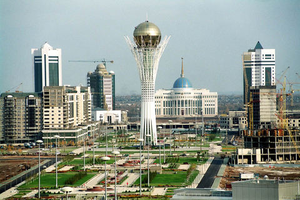CACI Analyst, May 15, 2013
Kazakhstani Authorities Issue Worrying Macroeconomic Statistics
by Georgiy Voloshin (05/15/2013 issue of the CACI Analyst)
On May 2, Kazakhstan’s Auditing Committee released detailed statistical data for 2012 concerning the state of the country’s budget and its evolution over the past calendar year. According to the information made public by the Committee’s chairman Aslan Musin who previously headed the presidential administration, the total losses incurred by state-owned or state-controlled companies amounted to over US$ 22.6 million. The survey of 300 companies with state participation effectively showed that more than 40 percent had not yielded any profits between January and December 2012. At the same time, the 40 biggest state enterprises account for 47 percent of the total losses or some US$ 10.7 million.
CACI Analyst, May 01, 2013
Plane Crashes Reveal Massive Corruption In Kazakhstan's Army
by Georgiy Voloshin (05/01/2013 issue of the CACI Analyst)
On April 23, Kazakhstani media reported that a Russian-built Mig-31 military aircraft owned by Kazakhstan’s Ministry of Defense had crashed during a training flight near a small village in Karaganda province in the country’s center. Although both pilots took urgent measures to be catapulted out of the cockpit, the aircraft’s captain did not survive his wounds after an unsuccessful landing. While the prosecutor’s office opened an official investigation, the preliminary assessments of the incident showed that the onboard navigation system had malfunctioned. The Ministry of Defense quickly reacted to the news stating that the aircraft had undergone capital repairs in December 2012 at a Russian assembly plant in Rzhevsk and was under maintenance warranty at the moment of its crash. Two days later, Askar Buldeshev, the Deputy Commander in Chief of Kazakhstan’s Air Defense Forces, was arrested by the country’s law enforcement agents on charges of corruption related to the purchase of military equipment from third parties.
Explaining Kazakhstan's Mediation Mission
by Richard Weitz (05/01/2013 issue of the CACI Analyst)
Kazakhstan’s government is atypical among Central Asian countries for its prominent efforts to reduce tensions in Eurasia as well as to increase understanding, trust, and cooperation between different regions, cultures, and religions. The Kazakhstani government’s motives in seeking such a prominent role are straightforward. It aims to reduce security threats and advance economic interests. It also wants to elevate the country’s profile in world affairs by hosting prominent international gatherings and by making visible contributions to international peace and prosperity. Kazakhstan’s main problem is that Astana’s limited diplomatic and other resources limit its ability to pursue its ambitious foreign-policy agenda.






